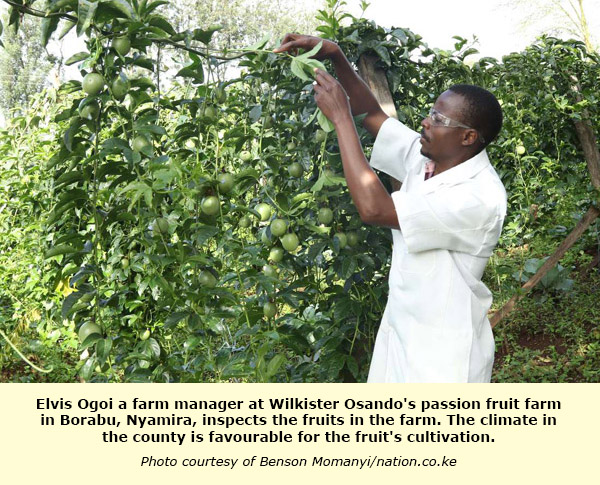Wilkister Osando fully understands what agribusiness is and enjoys every bit of it.
On her farm in Borabu, Nyamira County, there are 400 passion fruit plants. Their leafy vines are weighed down by the green-purplish gleaming fruits, dangling from their plants.

It is a beautiful scenery and one cannot hold back the temptation to pluck off a fruit to enjoy its juice.
The climate in Nyamira is favourable for the fruit and does very well in high altitude areas of 1,200 metres above sea level.
The ecological requirements are favourable with good soils and rain.
“Excess rainfall causes poor fruit set and encourages diseases mainly leaf and fruit rusts. For good production, passion fruits do well in a variety of soils, which should be reasonably deep and fertile with soil pH ranging between 6.0 and 6.5,” says Elvis Ogoi, the farm manager.
He says the fruits on their quarter-acre have proved to yield more returns than maize.
“Besides, we intercrop the fruit with pineapples and cabbages. This gives us more returns,” he says.
With good management, one is assured of 100 per cent output from the fruits. They sell the produce in the local market.
“Each harvesting season, we pick twice a week, that is, Monday and Friday and get about 70kg per harvest of the passion fruit. Each kilo goes for Sh85. It means we earn close to Sh50,000 weekly,” says Ogoi.
Extension officers from the Nyamira County government check on them often and ensure best farming practices.
The fruit, which has numerous health benefits and is rich in vitamin A and C, however, needs proper care for it to yield high returns.
One must use certified seeds, one of the main challenges faced by passion fruit farmers in Nyamira.
They get the seeds from the neighbouring Bomet County. There are no nurseries for the fruit in their county and they have to ‘import’ them from their neighbours.
“Nyamira County should invest in certified seeds so that we easily access planting materials,” urges Ogoi.
Crop rotation
They use grafted passion fruit seedlings, where the root (stock) is the yellow passion fruit while the scion the purple version.
The former is hardy and has a long shelf-life, is resistant to soil-borne diseases and is a good source of nutrients for the plant.
On the other hand, the purple passion fruit is prolific in terms of flowering and ends up with lots of good quality fruits.
Weeding is essential when the plants are first transplanted. Diseases are sufficiently controlled by crop rotation as plantations should not be kept for more than three years.
Infected plant material should be pruned and destroyed and vines kept as open as possible to allow thorough application of sprays.
Another challenge is pest management, which they also want the county government to intervene. Nematodes and mousebirds have also been a great bother to them.
Onsando, who is elderly and relies on her farm manager, says she exported their first harvest to Uganda, but could not meet the tough export conditions.
“At one time, we almost lost our crop to a strange disease that suddenly attacked our passion. But this has been well managed with the help of experts.”
Hundreds of farmers in Nyamira have embraced purple passion fruits farming, making the crop popular, as they abandon maize.
Nyamira County crops officer Jacob Keror says some 1,800 farmers are growing the crop.
The county currently produces more than 10,000 tonnes of passion fruit annually.
Laureen Ochari, the Horticulture and Crops Directorate officer in-charge of Bomet and Nyamira counties, says farmers from the region have realised that agribusiness is the way to go.
She says purple passion is marketable and they are now working with farmers to have them export their produce.
“The fruit has good markets in the Netherlands, Middle East, Polland and Holland,” she offers.
The county intends to put up a giant nursery with major passion varieties to ease accessibility of planting materials.
Source: Ruth Mbula, Daily Nation
